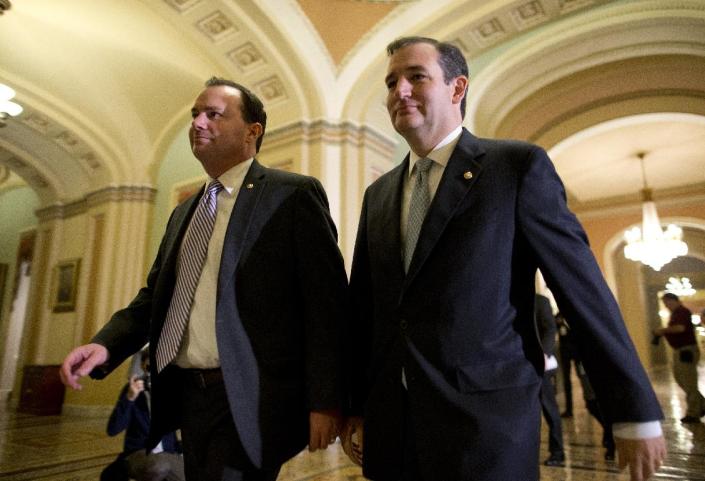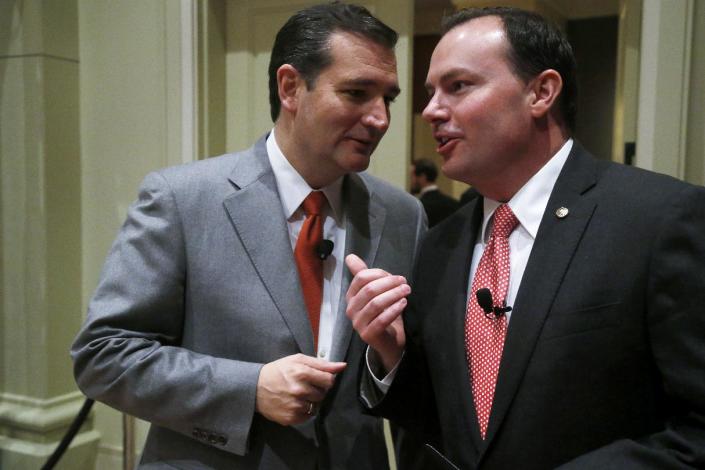Why Sen. Mike Lee needs to stay in Sen. Ted Cruz’s shadow
Cruz might be flirting with a White House run in 2016, but Lee has to run for reelection in Utah, and that’s no small task

Ted Cruz and Mike Lee are like the Batman and Robin of Senate conservative politics, renegades who buck leadership and upset their own colleagues — that is, if Batman got all the attention and most people outside Gotham didn’t know that Robin existed at all.
The differences between the two politicians are as stark as the contrast between their home states. Cruz, representing Texas, is brash, outspoken and openly considering running for president. Utah’s Lee is soft-spoken, generally better liked by colleagues and less of a staple on cable news than Cruz, who has taken the lead on conservative fights such as opposing the Affordable Care Act and immigration reform. Thanks to their contrasting styles, the two men are viewed differently by the media and by their own colleagues, even though their policy positions are nearly identical.
When the duo gummed up the works of Senate over the weekend, using its arcane procedure against the wishes of the GOP leadership to force a vote on the constitutionality of a $1.1 trillion spending package already approved by the House, Cruz was the one who was most openly chastised by other GOP senators and hounded by the press. But Cruz doesn’t need his colleagues to gain clout with a conservative base that disdains them, and so he has no political incentive to invest in relationships with other senators, according to Senate Republican aides approached for this story. On the other hand, Lee, who harbors no apparent presidential ambitions but will need to win reelection in Utah under new, less favorable GOP primary rules in 2016, does.
“It’s all about the approach. Sen. Cruz is much more bombastic about his message, and Sen. Lee has been more respectful of his colleagues in the approach,” said a senior Republican aide, who agreed on the condition of anonymity to talk more freely about other members. “Post-shutdown, it's worth looking at the way the two handled the next few months going forward. The chord that was struck was different … the incentives are very different.”
Indeed, when Cruz and Lee set the tripwires for a government shutdown in 2013 over defunding Obamacare, it was Lee who took the hit politically. His favorability numbers in Utah dropped precipitously, while Cruz’s popularity rose with Texas conservatives and his fundraising numbers went through the roof. Lee’s 40 percent approval rating during the October shutdown was the lowest for a sitting GOP Utah senator in years, according to a Wall Street Journal analysis of Brigham Young polling at the time.

In the wake of the shutdown fight, Cruz won plaudits with his Texas base and continued to relish his role as Democratic bogeyman, while Lee sought to refocus on middle-class policies in an attempt to win back points with Utah voters, according to Republican sources familiar with his work over the past year.
And in a move that made headlines in Utah last week but got little notice in Washington, Lee shook up his staff by hiring Neil Ashdown, the former chief of staff to moderate Republican Gov. Jon Huntsman.
Even conservatives are showing some concern about where Lee might stand in the state, with three key groups commissioning a poll to demonstrate Lee’s strength heading into the 2014 year-end fight that Lee and Cruz launched. The conservative Club for Growth, along with the Senate Conservatives Fund and Madison Project, released a poll Monday from a Republican pollster, Basswood Research, which showed Lee with a 72 percent favorability rating.
But there’s another reason conservative groups are going out of their way to paint him as far ahead, two years before he next faces voters: The political landscape for Lee has changed dramatically since he upset three-term incumbent Republican Bob Bennett in the 2010 GOP state convention. In 2014, the “Count My Vote” initiative in Utah effectively lobbied the state legislature for the first open, direct primary in the state’s history. Replacing caucuses at a GOP nominating convention with a primary means that the engaged tea party voters who swept Lee to victory four years ago will have a much smaller say in 2016 balloting. That also makes teaming up with Cruz again on a high-profile political fight a risky endeavor.
Though Republican lawmakers are quieter now about Lee than they are about Cruz, Lee could potentially need to actively court their support, just as he has done recently with business leaders in the state, according to a source familiar with Utah politics.
And that means getting senators who have so far refrained out of deference from any comment about him to actually say nice things publicly, which could be a leap.

Republican senators had plenty to say about Cruz on Saturday, as the procedural vote he and Lee forced paved the way for Senate Majority Leader Harry Reid, D-Nev., to push forward with more of President Obama’s pending nominees than he likely could have otherwise.
When asked Monday about the attention Cruz got for this maneuver, Sen. John McCain, R-Ariz. — no stranger to presidential bids himself — responded with trademark sarcasm.
“I was shocked! Shocked!” McCain said.
When asked why he thought Cruz was the target for much of his colleagues’ ire, and not Lee, McCain was equally terse: “I’ve made it very clear my feelings on that — it was very helpful to Harry Reid. I’m not getting into personalities on it. Come on, I’m too old.”
“Helpful for Harry Reid” is not a good political point for Republicans in any state, let alone a conservative stronghold like Utah, which borders Reid’s home state of Nevada.
Before Cruz arrived in the Senate in January 2013, Lee had often played a supporting role to former Sen. Jim DeMint, R-S.C., who was the leading champion of conservative causes in the Senate at the time. When DeMint left Congress to head the conservative Heritage Foundation, Cruz hired many of his former staffers and largely assumed his mantle of top conservative firebrand, with Lee again playing the part of backup.
If Cruz does decide to campaign for president in 2016, he would be spending more time on the trail and less time in Washington, leaving an opportunity for Lee to step into the leadership position on tea party issues. Only time will tell, however, whether Lee wants to do that, or even should, as he plots his own reelection at home.
Yahoo News’ Jon Ward contributed to this report.



